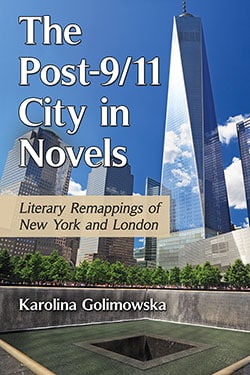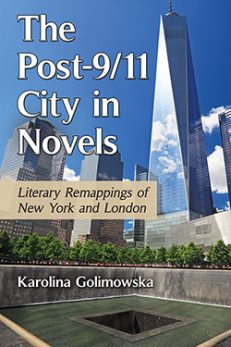The Post–9/11 City in Novels
Literary Remappings of New York and London
Original price was: $39.95.$31.99Current price is: $31.99.
In stock
About the Book
Post–9/11 fiction reflects how the September 11, 2001, attacks have influenced our concept of public space, from urban behavior patterns to architecture and urban movement. It also suggests a need for remapping the real and imagined spaces where we live and work. Through close readings of novels from both sides of the Atlantic, this analysis of the literary 21st century metropolis explores the fictional post–9/11 city as a global space not defined or contained by its physical limits.
About the Author(s)
Bibliographic Details
Karolina Golimowska
Format: softcover (6 x 9)
Pages: 212
Bibliographic Info: 3 illustrations, notes, bibliography, index
Copyright Date: 2016
pISBN: 978-0-7864-9937-3
eISBN: 978-1-4766-2454-9
Imprint: McFarland
Table of Contents
Acknowledgments v
Preface 1
Introduction: Reactions to 9/11 in American and British City Novels 5
Part One: New York
I. Remapping New York City in Jonathan Safran Foer’s Extremely Loud and Incredibly Close 39
II. Metropolis as Source of Literary Energy: Teju Cole’s Open City 55
III. The Ambiguity of the Other in Mohsin Hamid’s The Reluctant Fundamentalist and H.M. Naqvi’s Home Boy 70
IV. The Plurality of Voices and Urban Paths in Amy Waldman’s The Submission: The Metaphors of Submission 98
Part Two: London
V. Unpredictable and Insane: London as a Body, London as Brain 117
VI. Hemisphere 1: London East End 122
VII. Hemisphere 2: London West End in Ian McEwan’s Saturday 153
VIII. New York versus London: Joseph O’Neill’s Netherland 165
Conclusion 182
Chapter Notes 189
Bibliography 193
Index 199
Book Reviews & Awards
• “This book is a useful addition to studies of the contemporary metropolis in literature, especially in relation to trauma studies and post-9/11 studies”—Ethnic & Third World Literatures Review of Books
• “To add meaningfully to the already vast and ever growing body of scholarly work on the literature of 9/11 is a call of tall order. From the early treatments of key fictions such as Kristiaan Versluys’s Out of the Blue (2009) to encyclopedic compendiums such as Birgit Däwes’s Ground Zero Fiction (2011) and the numerous recent thematically focused analyses, scholars have turned to theories of trauma and of the spectacle, to the figure of the Other, to the transatlantic comparisons, and to the global geopolitical context to explain what sense contemporary Anglophone writers have made of the 9/11 terrorist attack and its ongoing reverberations in the early twentieth century. Karolina Golimowska is well-versed in, and capitalizes on, all these approaches, but she also manages to productively refocus the scholarly discussion of this body of work. … Following these twenty-first century flaneurs with Golimowska, the readers not only recognize New York City and London convulsed into daily rituals of vehement othering already familiar from previous studies of post-9/11 fiction but also rediscover them as open cities, as the cosmopolises they have always been, only even more so, paradoxically, in the wake of 9/11. This new focus allows Golimowska to broaden the scholarly purview by including less familiar novels, or novels not usually discussed in the 9/11 context, and to offer fresh interpretations of the well-studied texts.”—Journal of American Culture





